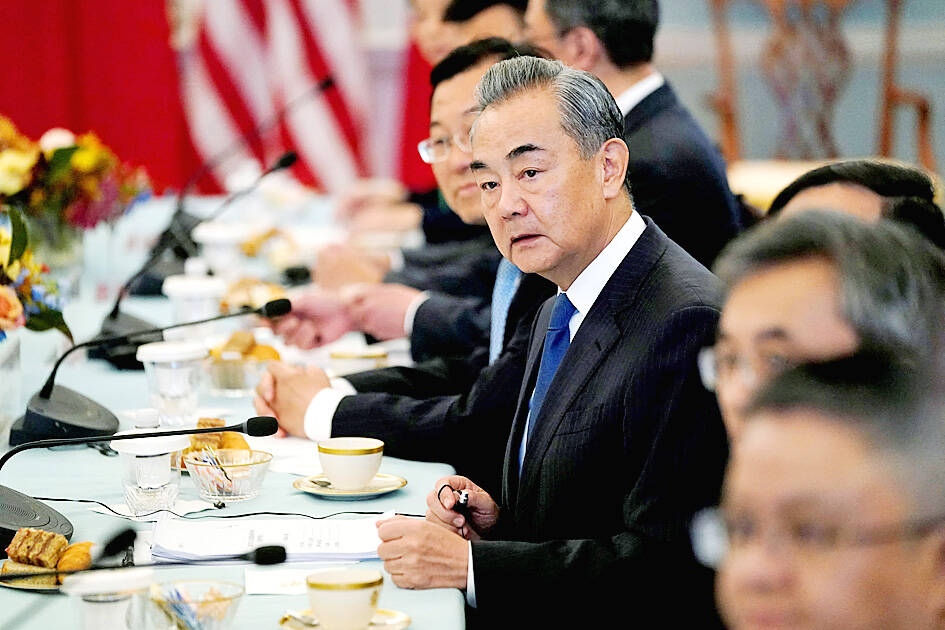The US and China on Friday agreed to work toward setting up a meeting between the two countries’ leaders next month, after US President Joe Biden met Beijing’s top diplomat at the White House.
Biden has invited Chinese President Xi Jinping (習近平) to San Francisco next month for the APEC summit at a time of tense relations between the two powers. Xi has not yet confirmed he would attend.
After Chinese Minister of Foreign Affairs Wang Yi (王毅) held talks with Biden and other senior US officials in Washington, the White House said that both countries had agreed to keep up “high-level diplomacy” to try to smooth ties.

Photo: Reuters
The two sides “reaffirmed” that they were “working together towards a meeting between President Biden and President Xi Jinping in San Francisco in November,” the White House said in a statement.
A senior administration official said the White House was leaving it to Beijing to confirm that Xi would come, but “we are making preparations for just such a meeting.”
An official readout of talks between Wang and US National Security Adviser Jake Sullivan released by Beijing confirmed “both sides agreed to make joint efforts to realize a meeting between the two heads of state.”
In a separate readout of his meeting with Biden, Wang was quoted as saying that his visit was aimed at “working to stop the decline in China-US relations, stabilize them, and bring them back to the track of sound and steady development.”
Biden told Wang that Washington and Beijing must “manage competition in the relationship responsibly and maintain open lines of communication,” the White House said in a statement.
Wang has been on a two-day visit to Washington during which he also met with US Secretary of State Antony Blinken.
After meeting with Blinken on Thursday, Wang acknowledged that differences would still come up, but said China would respond “calmly.”
Biden and Xi have had no contact since a meeting in Bali, Indonesia, in November last year. Relations have been tense for years between the world’s top two economies as they vie for influence in the Asia-Pacific region and beyond, and as Beijing boosts cooperation with Russia in a bid to reduce US dominance.
A particular point of contention has been Taiwan.
“The biggest threat to peace and stability in the Taiwan Strait is ‘Taiwan independence,’ and the biggest challenge to China-US relations is also ‘Taiwan independence,’ which must be resolutely opposed,” Wang said in the readout of his meeting with Sullivan.
In his meeting with Biden, he also stressed the centrality of the “one China” principle to US-China ties, according to the readout.
A senior US government official, speaking on condition of anonymity, quoted Blinken as telling Wang that the US opposes any unilateral changes to the “status quo” in the Taiwan Strait, and that the US would work to maintain peace and stability in the Strait.
Additional reporting by staff writer

The CIA has a message for Chinese government officials worried about their place in Chinese President Xi Jinping’s (習近平) government: Come work with us. The agency released two Mandarin-language videos on social media on Thursday inviting disgruntled officials to contact the CIA. The recruitment videos posted on YouTube and X racked up more than 5 million views combined in their first day. The outreach comes as CIA Director John Ratcliffe has vowed to boost the agency’s use of intelligence from human sources and its focus on China, which has recently targeted US officials with its own espionage operations. The videos are “aimed at

STEADFAST FRIEND: The bills encourage increased Taiwan-US engagement and address China’s distortion of UN Resolution 2758 to isolate Taiwan internationally The Presidential Office yesterday thanked the US House of Representatives for unanimously passing two Taiwan-related bills highlighting its solid support for Taiwan’s democracy and global participation, and for deepening bilateral relations. One of the bills, the Taiwan Assurance Implementation Act, requires the US Department of State to periodically review its guidelines for engagement with Taiwan, and report to the US Congress on the guidelines and plans to lift self-imposed limitations on US-Taiwan engagement. The other bill is the Taiwan International Solidarity Act, which clarifies that UN Resolution 2758 does not address the issue of the representation of Taiwan or its people in

US Indo-Pacific Commander Admiral Samuel Paparo on Friday expressed concern over the rate at which China is diversifying its military exercises, the Financial Times (FT) reported on Saturday. “The rates of change on the depth and breadth of their exercises is the one non-linear effect that I’ve seen in the last year that wakes me up at night or keeps me up at night,” Paparo was quoted by FT as saying while attending the annual Sedona Forum at the McCain Institute in Arizona. Paparo also expressed concern over the speed with which China was expanding its military. While the US

SHIFT: Taiwan’s better-than-expected first-quarter GDP and signs of weakness in the US have driven global capital back to emerging markets, the central bank head said The central bank yesterday blamed market speculation for the steep rise in the local currency, and urged exporters and financial institutions to stay calm and stop panic sell-offs to avoid hurting their own profitability. The nation’s top monetary policymaker said that it would step in, if necessary, to maintain order and stability in the foreign exchange market. The remarks came as the NT dollar yesterday closed up NT$0.919 to NT$30.145 against the US dollar in Taipei trading, after rising as high as NT$29.59 in intraday trading. The local currency has surged 5.85 percent against the greenback over the past two sessions, central